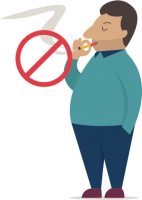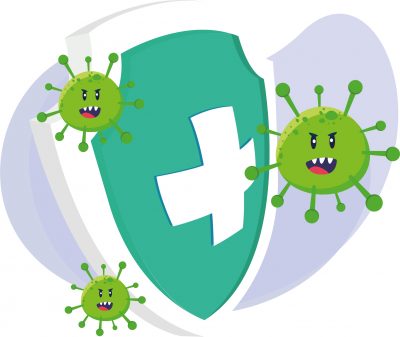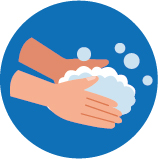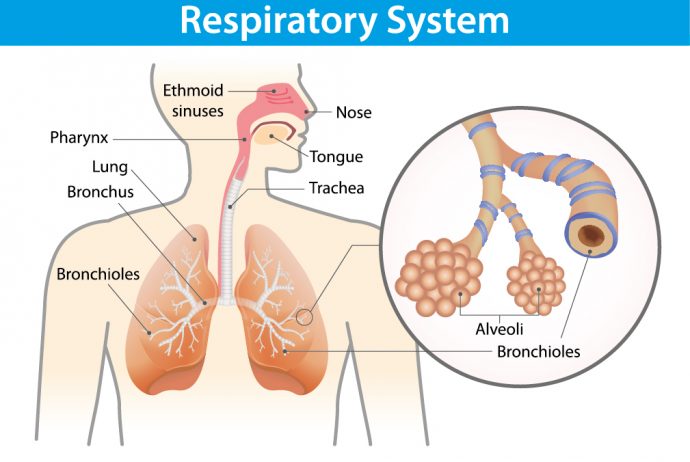A typical symptom of COVID-19 is breathing difficulty. This is a sign that the lungs or the respiratory system have been attacked by the virus. But how much do we actually know about the lungs, and how can we take care of this vital organ?
The lungs are the main organ of the respiratory system. When we breathe in, air fills up our lungs and oxygen in the air is absorbed into the bloodstream. At the same time, carbon dioxide produced by the body is expelled from the bloodstream into the lungs and then exhaled. This gas exchange happens in the alveoli, which are clusters of microscopic air sacs at the end of bronchioles in the lungs. This is called the respiration process, which is vital for any living organism.
In addition, the lungs and the respiratory system also function to:
- Regulate the temperature and humidity of the inhaled air to a proper level for the body.
- Prevent harmful substances from entering the body by coughing, sneezing or filtering them out.
- Facilitate the sense of smell.
Examples of lung problems
- Pneumonia: An infection in the lungs caused by pathogenic bacteria or viruses. The most common cause of pneumonia is Streptococcus pneumoniae (also known as pneumococcus).
- Asthma: When the airways become inflamed due to certain triggers such as cigarette smoke, dust mites, pet dander, etc. Symptoms include shortness of breath and wheezing.
- Chronic obstructive pulmonary disease (COPD): A group of lung diseases, such as chronic bronchitis and emphysema, that cause airflow blockage and breathing issues. COPD is usually caused by smoking, mainly in adults.
- Pulmonary embolism: When a blood clot blocks an artery in the lungs. The most common symptom is sudden shortness of breath.
- Lung cancer: The most common cause of cancer death worldwide. Most cases are a consequence of smoking.
- COVID-19: Caused by SARS-CoV-2 infection that attacks the respiratory system. COVID-19 can result in long-term lung damage, as well as other respiratory conditions.
How to take care of our lungs

- Don’t smoke or quit smoking: Cigarette smoke contains various harmful substances, like nicotine, tar and carbon monoxide, which can irritate the lungs and damage lung tissues over time. In fact, smoking is the leading cause of lung cancer and COPD. If you smoke, it’s never too late to quit. Warn your child about the harm of smoking and vaping.

- Avoid exposure to pollutants: Exposure to indoor or outdoor pollutants such as second-hand cigarette smoke, vehicle smoke or chemicals at home or work can be bad for the lungs. Make your home and car a smoke-free zone and ensure proper air ventilation indoors. Avoid exercising or spending time outdoors where there is heavy traffic or when air pollution is bad.

- Stay active: Regular exercise keeps our body healthy and optimises lung function. Aim for 30 minutes of moderate physical activity five days a week. Include aerobic activities like jogging or jumping rope, as well as muscle-strengthening exercises like weightlifting or push-ups. Don’t forget to perform deep breathing exercises to improve lung function.
- Regular check-ups: Some lung problems may not show obvious symptoms. Regular check-ups are vital for early detection and treatment of any respiratory problems and prevent it from worsening. During a check-up, your doctor will listen to your breathing, address any concerns and carry out additional tests if necessary.

- Get vaccinated: Lung infections can be dangerous, especially for high-risk populations, like children under 5 years old, the elderly and people with a chronic disease. The best way to prevent a lung infection is via vaccination. Consult a healthcare practitioner to get you and your family vaccinated against pneumococcal disease, influenza and COVID-19.

- Other preventive steps: Practising good hygiene, frequent handwashing, proper sneeze/cough etiquette, wearing face masks, avoiding crowded areas – all these measures have been proven to help mitigate the transmission of respiratory diseases, especially during an outbreak.
Sometimes, we tend to take our lungs for granted. It’s only after problems start arising that we regret not taking care of our lungs. The fact is, the lungs are a vital organ that keeps us alive, hence it is crucial to prioritise the health of our lungs and respiratory system. Start taking care of our lungs today!






Comments